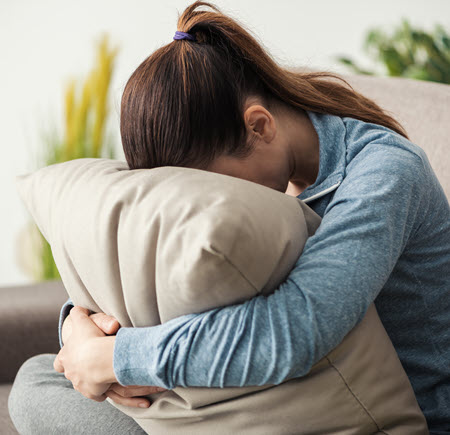 Anxiety keeps us from living in the moment…
Anxiety keeps us from living in the moment…
… as we worry about something that may or may not happen down the road, an hour later, a day later, or in the future. When we do this, we rob ourselves of living each moment of our lives to the fullest. Anxiety and panic interfere with daily activities.
You can be so overwhelmed with worry that you don’t enjoy moments like playing with kids or grandkids, enjoying a movie with family, or being present in the moment’s conversation. These feelings of anxiety or panic attacks are difficult to control, are out of proportion to the actual danger. You may avoid places or situations to prevent these feelings.
After you drop off the kids at school, you worry they won’t eat their lunch or have concerns about playing on the playground. You may worry about catastrophes, such as earthquakes or war, and these worries keep you from leaving the house. Many people are worried about going anywhere because of the risk of contracting a disease. There’s also anxiety about how and when this will end. Some people have more physical symptoms of anxiety on top of their worries.
Anxiety has many symptoms, including trouble concentrating or thinking about anything other than the present worry, feeling a sense of impending danger or panic, rapid breathing, feeling nervous, restless or tense, or trouble sleeping, just to name a few. You may feel some of these, and they can be debilitating.
Anxiety is something we can’t necessarily get rid of…
But no worries! 😉 This is because occasional anxiety is a normal part of life. You might worry about things like health, money, or family problems. Everyone experiences stress and anxiety in their lives.
Anxiety is normal when facing difficult or stressful situations. Sometimes having a little anxiety before a test can help you perform better.
People with severe anxiety symptoms feel extremely worried or feel nervous about these and other things – even when there is little or no reason to worry about them. They find it difficult to control their anxiety and stay focused on the tasks at hand.
 But you can learn to manage anxiety.
But you can learn to manage anxiety.
You don’t have to let it gain a life of its own and start running yours!
Many therapeutic techniques are effective in treating anxiety. We will immediately allow you to share your most stressful, anxiety-ridden moments as we get to know each other. I will provide you with ways to quickly and easily manage some of your symptoms, including gratitude exercises, learning to focus deliberately, mindfulness, tapping, and breathing exercises. You will try to practice these at home.
During subsequent sessions, we will delve into the origins behind your anxiety and recognize your emotional responses. We will use elements of CBT, such as psychoeducation. You will gain the tools to manage and quiet your Anxiety to live a more relaxed life.
Is it depression?
It gets more challenging to show up for life each day. Getting things done is your priority as it helps you feel you still have some control over what is happening, but it is hard! In reality, you may have lost interest in hobbies or social outings you used to enjoy fully. You are feeling fatigued or drained most of the time, partially because your sleep habits have changed.
You may wake up frequently thinking about stressful situations or simply wondering why you feel this way. Or maybe you stay up late to avoid lying in bed with ruminating thoughts for hours on end before you finally do fall asleep. Sometimes you forget things, maybe a little more than usual. It is taking more effort to concentrate on work, home, and even yourself.
Women out there who “have it all.” All, along with an underlying feeling of emptiness or sadness. You think…
Maybe it’s hormonal? Maybe you just need some time off? What is happening? Maybe… Is it depression? Let’s find out together.
 The struggle is real.
The struggle is real.
Living with depression or depressive symptoms daily is a serious struggle. You don’t feel like showering more days than you’d like to admit. Cooking or household chores just don’t get done. Your energy is sapped.
Sometimes you forget to pay a bill. You are frustrated. Unsure why you feel this way, you try your best to push it aside and fight through your day, resisting the urge to go back and hide under the bedcovers. You notice that situations have you annoyed or irritated way more than usual, then guilt follows!
I shouldn’t be feeling this way!
Stranger yet, even though the family has been stuck at home together, you just can’t fight the loneliness you feel inside…
You are coping the best you can, but you need more.
I invite you to attend a session with me. I provide a supportive environment and can relate to many of your feelings.
Help is out there.
In the calm, warm, and comfortable environment I provide, you will feel welcome and express yourself openly.
I will immediately allow you to share your most troublesome, confusing, depressing moments as we get to know each other and form a therapeutic bond. I will provide you with ways to quickly and easily manage some of your symptoms, including relaxation techniques, breathing exercises, and self-care, among others. You will practice them regularly at home. I may also direct you to schedule a regular hobby or social outlet that you haven’t in a while.
During subsequent sessions, we will explore your depression and emotional responses. As we work together, you will find clarity. Using the strategies at home will minimize present symptoms. You will start to feel like yourself again and look forward to living your life instead of just existing.
 If you suffer from one or both conditions, you’re not alone.
If you suffer from one or both conditions, you’re not alone.
They are more common than you might think, and they often occur together. They can be treated similarly, though present differently.
I like this description from Psychology Today by Hara Estroff Marano, published October 1, 2003:
“They’re probably two sides of the same coin,” David Barlow, Ph.D., director of the Center for Anxiety and Related Disorders at Boston University. “The genetics seem to be the same. The neurobiology seems to overlap. The psychological and biological nature of vulnerability are the same. It just seems that some people with vulnerability react with anxiety to life stressors. And some people, also, go beyond that to become depressed.”They close down. “Depression seems to be a shutdown,” explains Barlow. “Anxiety is a kind of looking to the future, seeing dangerous things that might happen in the next hour, day, or weeks. Depression is all that with the addition of ‘I really don’t think I’m going to cope with this, maybe I’ll just give up.’ It’s shutdown marked by mental, cognitive, or behavioral slowing.” – last reviewed on February 5, 2020.
Forming our therapeutic alliance…
You must have a calm, safe, empathic environment to share your feelings. It is my goal to provide this for you.
This relationship is so important because it allows you to explore your experiences through our therapy sessions. We engage with each other effectively to promote the change you want to achieve in yourself.
To help develop a therapeutic connection with you, I will do my best to help you feel welcome by making eye contact, engaging you in conversation, assuring you feel safe.
I will ask you what you would like to get out of therapy sessions. I understand that relationships take time, and I will provide a nonjudgmental environment for you to ease into and speak your mind. Also, to assure my understanding and let you know I am truly listening, I will reflect, restate, summarize, or paraphrase at necessary times during sessions. I may ask for clarification. I will show you I am actively and empathically listening to you. I will ask a lot of questions. I am interested in what you have to say.
This will all work together to gain a trusting bond, caring, and mutual respect necessary for treatment to be successful.
 Let’s get you to feeling like yourself again…
Let’s get you to feeling like yourself again…
You’ll benefit from empathy and support as you process your deepest fears and anxieties.
I will provide a comforting environment where you can relax and finally express the complicated feelings you are dealing with. It will help lighten your load as we move toward discovering the ‘you’ waiting to emerge free of these constraints.
You’ll gain insight into reasons you feel this way as you come to an understanding of its origins.
As we process in session, we will look back in time to determine any other times in your life that you may have felt budding anxiety, worry, fear, or panic. We will explore past events to determine if they are a significant source of current negative thoughts or feelings.
You’ll receive tools and strategies to help you manage the day-to-day anxiety and depression you feel as their frequency and intensity decrease.
Many of the tools to manage anxiety are also beneficial to those with depression or those suffering from both. Even if you are taking medication, both medication and talk therapy are highly effective in treating depression. Often keeping a daily log of feelings and reactions can help us learn the dynamics of your specific issues. We will implement some calming exercises.
You’ll leave sessions with “homework,” which most times is practicing techniques or skills learned in the session.
While processing in session, you can visualize events, recognize feelings, and challenge some irrational thoughts you may possess. As a take-away, therapeutic exercises to do at home keep the momentum from the session going to maximize your goal to feel like your true self again.
You don’t have to feel this way anymore.
I know how difficult taking the first step can be, but you’re doing it!
I understand how you feel.
We can work on this together.
Now is a great time to call me at (941) 404-5922 for a free 15-minute consultation.
If you have suicidal thoughts or a loved one is in immediate danger, call 911 or go to your nearest emergency room.
For more mental health resources, see my FAQ page.

